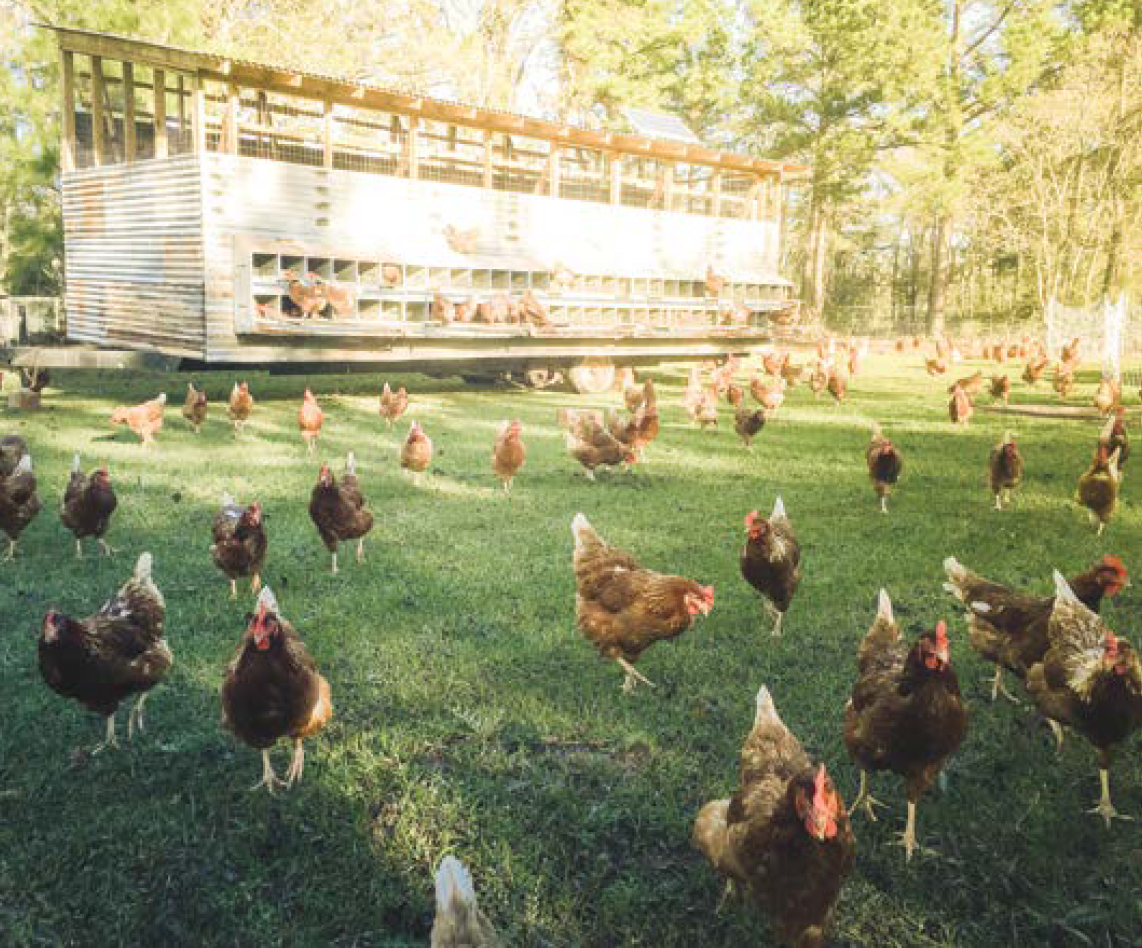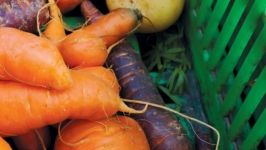A Good Egg: Sara Wilson of Three Sister Farms
After five generations of farming, it’s safe to assume that Sara Wilson, owner of Tomball-based Three Sister Farms, and her family have the trade embedded in their ancestral roots. In the late 1800s, Wilson’s family moved from Sweden to the U.S. and eventually ended up in the Midwest, where they tilled the earth, raised livestock and worked from sunup to sundown.
Wilson got her first taste of farming when she was 4, spending summer breaks working on her grandfather’s Minnesota farm. While the work wasn’t easy, Wilson, now 39, remembers reveling in and appreciating the rough-and-tough labor right away, feeling at home and at peace on the diversified farm where her grandfather grew wheat and raised chickens, pigs, sheep and dairy cows.
“It was one of my favorite times of life. I had my special hat, my special boots, my special overalls, my special outfit, and as soon as I got to the farm it was heaven. I didn’t care about places like Disney World. It was Grandpa’s farm for me. He was my hero,” she says. “It was just so peaceful out there.”
Before Wilson was born, her family moved from the Midwest to Houston, and eventually Spring, seeking opportunity and success outside of farming. But even on those six acres far away from her g r a n d f a t h e r’s 500-acre oasis, Wilson found herself exploring the farmer’s way of life: riding horses, keeping pet rabbits and goats, and raising hogs, sheep, chickens and turkeys for organizations such as Future Farmers of America.
When it came time to pursue an education and career path, though, Wilson ultimately chose a different route, first going to college in Minnesota — not far from her grandfather’s farm — and then working in aviation recruiting. In 2007, she moved to Austin to study renewable energies at Austin Community College and interned at a solar technology company.
It was in Austin where Wilson’s passion for farming returned. She ultimately decided that she wanted to leave the corporate “rat race” and return to her roots. “I realized I wanted to grow vegetables, I wanted to be a farmer and I wanted to farm,” she says. “It took a lot of grit to make that decision, but I knew it was right for me.”
The timing couldn’t have been better. While Wilson was contemplating leaving the corporate world, her parents settled on 60 acres in Tomball. They encouraged Wilson to start her farm on that land in late 2014. With only around $2,000 in the bank, Wilson moved to Tomball and settled on “Three Sister Farms” for the property’s name, a nod to an Indigenous approach to farming in which beans, corn and squash are grown together. And although Wilson started out with 1,500 tomato plants, growing produce turned out to not be her calling.
“That first year I had no idea what I was going to do. We had all these horrible rains, and the ground wasn’t ready to be farmed. It was a very clay-based soil, and there wasn’t much compost in there,” she says. “Then once the tomatoes started coming in, I couldn’t get into any of the farmers markets, so I found a farm store that bought my tomatoes basically at cost. I was like, ‘Okay, I don’t know what I'm going to do, but I need to figure something else out.’”
After noticing several prominent vendors selling eggs at farmers markets, Wilson decided to try her hand at raising egg-laying chickens. Going in headfirst rather than pacing herself, Wilson purchased 1,000 chickens and raised them in a brooder she built.
Though she had reached out to farmers markets in the past to no avail, the chips started falling into place when Wilson connected with Tyler Horne, Urban Harvest’s director of farmers markets. Initially, Horne arranged for Wilson to sell eggs in the Gardeners Corner, a section of Urban Harvest’s Saturday farmers market that is set aside for small-scale home growers. Shortly thereafter, Tomball Farmers Market got back to Wilson about joining them as a vendor.
With the advice of a trusted mentor, Michael Marchand of Whitehurst Farm in Brenham, Wilson added additional livestock to her farm, including meat chickens, heritage-breed pigs, cattle and sheep. Over time, she added staff to help her and received assistance from close friends and family members. Despite this help and every effort to educate herself via YouTube videos and fellow farmers on social media, Wilson says there was nothing that could have prepared her for the harsh, on-the-job realities and lessons that actual farming brings.
Wilson can name examples like: not building a chicken house at a high-enough elevation, leaving her to find dead chickens after a flash flood; seeing vultures eat newborn piglets; and a wild boar breaking through a fence to breed with her swine. “Those are expensive, hard lessons to learn because you must go through them. It’s gutwrenching, not just from a financial perspective, but having to literally pick up those dead animals and bury them,” she says. “You can read and learn a lot. There’s science to it, but there’s nothing like actually living it, doing it, and crying about it. No one can prepare you for it.”
One thing that Wilson has noticed in her years doing demanding farm tasks such as hauling animals to a processing facility, collecting and cleaning eggs, and preparing for weekly markets, is how much the appreciation for local farmers has shifted in the general public. She noted that during the pandemic people turned to local farms to provide what grocery stores couldn’t when significant supply-chain bottlenecks caused a severe lack of inventory.
Even though that demand has certainly decreased again now that grocery stores have returned to more normal operations, Wilson says that there are loyal customers who have stuck around to support local farms like hers, in part due to her commitment to a more humane approach to farming. Wilson has witnessed the grim realities of confinement barns where animals are raised en masse with a significantly low quality of life. There’s a stark difference between the way her animals live and the way animals in confinement barns live.
“I’ve walked in [confinement barns] and seen what those pigs look like,” she says. “I’ve seen their ears sagged down and their tails flopped. And the smell in there is so bad that my skin, no matter how many times I took a shower after working there, still smelled three days later. You’re telling me that for the 6-7 months that pig is in there — its entire life — that that meat is going to be quality meat and that animal has lived a quality life? No way. It’s terrible,” she says. “I look at my pigs and they’re outside laying in a mud puddle. They eat what they want to eat, they run, they jump.They do pig things. Their ears flop and their tails are curled. They’re happy.”
As for what’s to come, Wilson hopes to open a store with her products and provisions from other local vendors. She has purchased property for the store on the same street as her farm, but the price of lumber and other financial factors has put the project on hold for the time being.
Through all the hardship, long days and literal tears, Wilson has come a long way in her eight years farming, becoming a respected, sought-after vendor selling hot-ticket items like pastured eggs from chickens and ducks, and heritage-breed chicken, beef and pork at the Tomball Farmers Market and at Urban Harvest, where she now has a double booth at the market’s entrance. She also features seasonal items when she has them, like turkey, lamb, and quail and goose eggs.
The markets are an immersive, personable experience she looks forward to every week. She says, “There’s something grassroots about shaking hands and kissing babies every Saturday, and building a meaningful, lasting relationship with people.”






